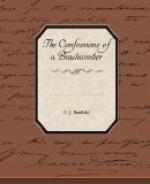Another grandly free man sailed his cutter into the bay one fine morning. He knew the water and ran her on the sand, brought his anchor ashore and shoved her off, to swing lazily the while. When I paid him a ceremonious visit, I found that he had but one arm. The empty right sleeve was the more pathetic when I saw him mixing his flour for a damper, and in the cunning twists and wriggling by which the fingers freed each other of the sticky dough and other dextrous manipulations, I soon came to recognise that with his left hand he was as deft as many men with their right and left. He had sailed the boat ladened with wire netting and heavy goods from Bowen, 200 miles south, and was on his way to his selection, 100 miles further north. A wiry, slight man though a real “shellback,” one who had been steeped in and saturated with every sea, was “giving the sea best,” nerve-shaken, so he said—and yet sailing a cutter with but 3 or 4 inches of free board “single-handed.” And he told the why and wherefore of his fear of the sea.
With a mate he had been for many months, beche-de-mer fishing, their station or headquarters a lonely islet in Whitsunday Passage, which winds about that picturesque group of islands through which Captain Cook passed in the year 1770. The twain had been out on one of the spurs of the Great Barrier Reef, and had been caught in the toils of adverse weather. After beating about for days they managed to make their station—hungry, thirsty, their souls fainting within them. Shelter and comfort were theirs, and it was no surprise to my visitor when his mate slept the next morning beyond the accustomed time. “Let him rest,” he said. “He is dog-tired;” and went about the work of the day. He had himself known what it was to sleep eighteen and twenty hours at a stretch, for he had many times been worn by toil and watching and nerve-tension to the limit of endurance. And so the day passed, and the man in the bunk slept on. Peace and rest were his, and the busy man envied the calm indifference to the day’s doings that he could not find in his heart to disturb.
“Won’t he feel fresh when he does wake,” he reflected. “He’ll be a bit narked at having wasted a whole bloomin’ day. I shouldn’t be surprised if he was savage, because I didn’t call him.”
When the evening meal was prepared and everything in the tiny hut made orderly, it would be a pleasure for him to wake up and discover that he had been allowed to have his sleep out.
Ah! but his sleep was very sound and very silent—almost too stillful to be natural.
A touch on his shoulders, saying—“Andrew. Wake up, old fellow!”
No movement, or response. His feet—cold! cold! and his chest, too, cold!
The mate had found his port after stormy seas. His heart—worn out with stress and strain—had failed within him, and all day long his companion thought tenderly of him, making but little noise, thinking that his sleep was the sleep of a day, not the sleep of eternity that no earthly din may disturb.




